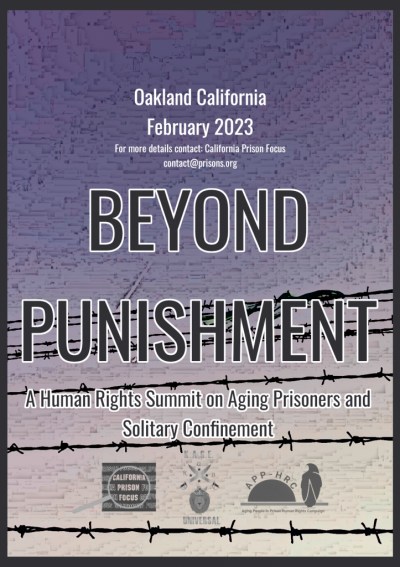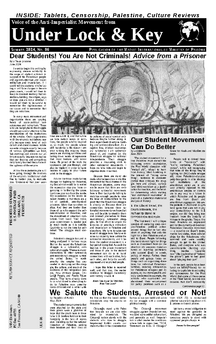
CPF Demands Gov. Newsom Liberates Our Elders

Recently a comrade from outside California wrote MIM(Prisons) to ask for an update on the leaders of the movement against solitary confinement because ey hadn’t heard anything about them recently. The below letter to CA Governor Newsom provides that update in the context of an ongoing agitational campaign.
While MIM(Prisons) supports the release of these elders, we focus our campaigning on the release of all people from long-term solitary confinement in line with the U.N. Mandela Rules. The decision to settle with the California Department of Corrections and Rehabilitation in the Ashker suit was a huge blow to this cause. While we don’t know what would have happened if the trial went to court, we knew and know exactly what a settlement would mean. Comrades in Texas and elsewhere should take a lesson from the leaders still sitting in solitary confinement in California a decade later. SHU/RHU/Control Units are torture! There is no acceptable outcome of our campaign against solitary confinement other than abolishing them completely.
KAGE Universal
4408 Market St., Ste. A
Oakland, CA 93608
Governor Newsom
1021 O Street, Suite 9000
Sacramento, CA 95814
March 18, 2022
RE: Liberate Our Elders
Dear Governor Newsom et al.,
California Prison Focus (CPF) and K.A.G.E. Universal are requesting your immediate action under the current humanitarian health crisis to investigate the ongoing retaliation being faced by the imprisoned human rights activists and members of the Prisoner Human Rights Movement (PHRM) who authored and honored the historic 2012 Agreement to End Hostilities (AEH), significantly reducing violence on California’s prison yards, and beyond. The Agreement to End Hostilities encourages conflict resolution and direct communication between races to counter violence between prisoner organizations. This opened the doors for the prison to begin providing a host of rehabilitative programs. Because of the sacrifices those individuals made, countless others have been saved from enduring decades-long solitary confinement torture as they did.
When these men, who had been tortured in solitary confinement for decades had attempted to disseminate and promote this historic accord, California Department of Corrections and Rehabilitation (CDCR) obstructed their efforts, claiming that the AEH qualifies as third-party communication. Staff members refused to post the statement throughout the prison, while during that same period, and since many years earlier, CPF was receiving reports that guards were placing “disruptive” individuals on the yards to instigate fights. [See Prison Focus archives, www.prisons.org]
“Mr. Y stated that some people try to sabotage it, namely the correctional officers, who continue to try to trick the general population with their anti-solidarity games…” Pelican Bay State Prison Report, PF Issue 48, Winter 2016
CDCR claimed that the signers of the AEH presented a major threat to the safety of the general prison population and in September 2013, there were approximately 3,881 prisoners in CDCR’s Security Housing Units (SHU) when the AEH had just been distributed inside CDCR and outside to civil society.
Approximately 2000 people were released from the SHU starting in early 2016 as a result of the Ashker v. Brown settlement agreement. When these older men came out of the SHUs, their principle thinking, and mentoring of younger prisoners in General Population yards created a dramatic decrease in violence, except when instigated directly or indirectly by prison policy and/or guards. To the contrary, as the men returned to the yards struggling to cope after decades of torture, they continued to promote and honor the AEH. Their commitment to non-violence and class unity among the SHU “kickouts” was even more remarkable as CDCR did nothing to assist SHU prisoners in transitioning to General Population even though it was extremely difficult for them after decades of being in solitary, living 24/7 in tiny cells with no natural light and under severe and harsh conditions.
CPF received reports and letters that the elders who were released from solitary confinement after so many decades were having a profound impact in reducing violence on the yards. At the same time CPF was receiving hundreds of letters a year, reporting incidents of violence that were directly or indirectly caused by both overt and covert actions taken by prison staff, sanctioned by the policy and prison administration of CDCR.
The signers by every organized group in CDCR, those who promulgated the AEH, and their fellow prisoner organizers of the California Prison Hunger Strikes, have been suffering from extreme retaliation ever since. Twelve of the original 16 signers continue to languish in prison today, as most of them are still being held in one form or another of solitary confinement. One organizer died before he was ever to see freedom. Others have received new and serious charges that are possibly retaliatory, so as not to disrupt CDCR’s false narratives that the organizers of the historical California Prison Hunger Strikes are the worst of the worst. And while studies claim that California faces a 66% recidivism rate, they continue to refuse to release these elders who pose a risk of less than 2%.
This constitutes a human rights crisis and we can no longer remain silent. We demand that the signers of the AEH, as well as for all organizers and participants of the California Prison Hunger Strikes, to be safe from retaliation, including further torture, isolation or, as laid out in the PHRM Blueprint, from being coerced, threatened and blackmailed to betray fellow prisoners with false accusations. We demand that the signers of the AEH be granted 2933 credits, based on the attached Certificate of Acknowledgment, to reduce or modify their sentences, and receive an immediate opportunity to demonstrate their readiness to return to their communities, starting with the individuals who have already had a positive impact on their community and society and would clearly have an even greater positive impact they will have on society as a whole if released.
In addition, the PEACE program that has already been established at Pelican Bay State Prison joins CPF and KAGE Universal to request that the AEH be posted throughout all CDCR institutions, using Inmate Welfare Funds.
Sincerely,
Minister King X, K.A.G.E. Universal, Founder, Executive Director
California Prison Focus, Director of Culture and Art
Cc: Kathleen Allison, CDCR Secretary
Signers of the Agreement to End Hostilities








